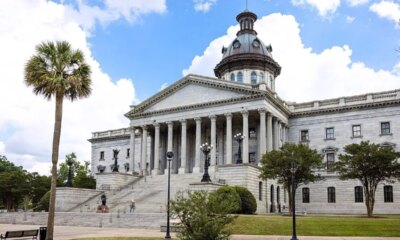Montana
Group kicks off signature gathering efforts for Montana abortion access ballot petition • Daily Montanan

The group behind a ballot petition to enshrine abortion access in Montana’s constitution formally kicked off its signature gathering campaign Tuesday, telling supporters it is critical the initiative pass in November if Montanans want to avoid restrictions being imposed like those in Texas and other Republican-led states.
Montanans Securing Reproductive Rights had already started gathering signatures to try to get Constitutional Initiative 128 onto November’s ballot last week in some of the state’s most populous cities, but Tuesday’s event at Mt. Ascension Brewing Company in Helena marked its official start to its effort to gather more than 60,000 valid signatures from Montana voters by the June 21 deadline.
“Abortion is a topic that’s become politicized and stigmatized, but in reality, we all love someone or are someone who’s had an abortion,” said Martha Fuller, the CEO and president of Planned Parenthood Advocates of Montana, one of the organizations that makes up Montanans Securing Reproductive Rights. “We can no longer let politicians threaten access to the lifesaving, essential care that thousands of Montanans need and deserve. Montanans must act now to proactively secure our right to abortion and CI-128 will protect the rights that we currently have for good.”
Speaking to several dozen supporters, members of the group, which also includes the ACLU of Montana and Forward Montana, said they believe Republican lawmakers in Montana will continue to push the bounds of the 1999 Armstrong v. Montana Supreme Court decision that found Montanans’ right to privacy includes a right to abortion access.
They said passing the initiative in November would ensure the legislators do not continue creating laws restricting that access after the U.S. Supreme Court overturned Roe v. Wade and put decisions about abortion access back into the hands of the states.
Dr. Sam Dickman, an abortion provider and physician who is the chief medical officer of Planned Parenthood of Montana, was nearly brought to tears as he recounted working in Texas when its abortion ban took effect and seeing patients have to travel to other states for care, and others who were pregnant after being sexually assaulted being forced to carry the pregnancy to term.
He said while the current court precedent has upheld abortion access in Montana, passing the constitutional amendment would ensure that lawmakers or courts couldn’t take that access away overnight. He cited the Arizona Supreme Court’s recent decision upholding a law passed before Arizona became a state as an example of how quickly the landscape can change for patients and providers.
“Montanans deserve dignity; they deserve the right to make medical decisions for themselves and their families, and no politicians should interfere with those decisions,” Dickman said. “I’ve seen what those abortion bans lead to, and we don’t want to see those consequences here in Montana.”
Fuller said the group already had at least 400 volunteers signed up to help gather signatures and promote the campaign. Akilah Deernose, the executive director of the ACLU of Montana, said she believed efforts by the attorney general to keep the group from moving their initiative forward reinforced the group’s stance that abortion access is still under threat, and that has invigorated supporters.
Mikayla Pitts, the voter engagement and reproductive rights organizer for Forward Montana, said in the months the group has been doing voter registration drives on college campuses this year, she’s heard from many students interested in supporting the initiative.
Emma Foster, a Montana State University student, and Lily Madison, a high school junior, both said that younger people they had spoken with were energized by the campaign because it could have a large say in whether they want to stay in Montana for college or their careers.
“Attacks on our fundamental rights are bad for Montana. They cost us students, workers, doctors and businesses, and they make young people like myself feel like the state doesn’t value our rights and who we are,” Foster said.
The group said the signature gathering effort would be focused in Montana’s larger population centers, but that they have volunteers ready to go in more rural parts of the state as well since they have to gather signatures from 10% of the voters in 40 different state House districts.
“I think it’s going to be a volunteer effort like you don’t see with a lot of ballot measures,” Fuller said. “People are really engaged.”
She said the group will not be participating in Thursday’s Law and Justice Committee hearing on the initiative. Republican lawmakers decided to hold the hearing in order to give the measure an up-or-down vote despite the Montana Supreme Court already ruling that the initiative did not need to go through the committee hearing because of the way the law is written and that the committee’s vote will not be recorded on the ballot petition.
“I think that we’ve seen a lot of theater so far around this ballot measure and we are just ready to get to work and leave the theater up to politicians,” Fuller said.
The group said it was prepared to fight any other possible legal battles surrounding the initiative and the validity of the signatures it gathers should they arise, but their hope is to put the matter of abortion access to rest through a citizen-approved amendment to the constitution that legislators cannot change through lawmaking.
“Some legislators come into this town to rip our rights away instead of defending our constitutional rights and embracing freedom,” Pitts said. “Legislative session after legislative session, they push more extreme bans, and we’re tired of it. And we’re going to tell them at the ballot box.”
ci-128

Montana
Montana Lottery Powerball, Lotto America results for March 2, 2026
The Montana Lottery offers multiple draw games for those aiming to win big.
Here’s a look at March 2, 2026, results for each game:
Winning Powerball numbers from March 2 drawing
02-17-18-38-62, Powerball: 20, Power Play: 2
Check Powerball payouts and previous drawings here.
Winning Lotto America numbers from March 2 drawing
03-08-17-24-34, Star Ball: 06, ASB: 02
Check Lotto America payouts and previous drawings here.
Winning Big Sky Bonus numbers from March 2 drawing
06-12-19-29, Bonus: 11
Check Big Sky Bonus payouts and previous drawings here.
Winning Powerball Double Play numbers from March 2 drawing
21-28-58-65-67, Powerball: 25
Check Powerball Double Play payouts and previous drawings here.
Winning Millionaire for Life numbers from March 2 drawing
28-41-42-50-55, Bonus: 02
Check Millionaire for Life payouts and previous drawings here.
Feeling lucky? Explore the latest lottery news & results
When are the Montana Lottery drawings held?
- Powerball: 8:59 p.m. MT on Monday, Wednesday, and Saturday.
- Mega Millions: 9 p.m. MT on Tuesday and Friday.
- Lucky For Life: 8:38 p.m. MT daily.
- Lotto America: 9 p.m. MT on Monday, Wednesday and Saturday.
- Big Sky Bonus: 7:30 p.m. MT daily.
- Powerball Double Play: 8:59 p.m. MT on Monday, Wednesday, and Saturday.
- Montana Cash: 8 p.m. MT on Wednesday and Saturday.
- Millionaire for Life: 9:15 p.m. MT daily.
Missed a draw? Peek at the past week’s winning numbers.
This results page was generated automatically using information from TinBu and a template written and reviewed by a Great Falls Tribune editor. You can send feedback using this form.
Montana
Apparent AI Glitch in Filing by Montana Public Defender, Recent Congressional Candidate

Everyone makes mistakes, even experienced professionals; a good reminder for the rest of us to learn from those mistakes. The motion in State v. Stroup starts off well in its initial pages (no case law hallucinations), but is then followed by several pages of two other motions, which I don’t think the lawyer was planning to file, and which appear to have been AI-generated: It begins with the “Below is concise motion language you can drop into …” language quoted above.
Griffen Smith (Missoulian) reported on the story, and included the prosecutor’s motion to strike that filing, on the grounds that it violates a local rule (3(G)) requiring disclosure of the use of generative AI:
The document does not include a generative artificial intelligence disclosure as required. However, page 7 begins as follows: “Below is concise motion language you can drop into a ‘Motion to Admit Mental-Disease Evidence and for Related Instructions’ keyed to 45-6-204, 45-6-201, and 4614-102. Adjust headings/captions to your local practice.” Page 10 states “Below is a full motion you can paste into your pleading, then adjust names, dates, and styles to fit local practice.” These pages also include several apparent hyperlinks to “ppl-ai-file-upload.s3.amazonaws,” “ppl-ai-fileupload.s3.amazonaws+1,” and others. The document includes what appears to be an attempt at a second case caption on page 12. It is not plausible on its face that any source other than generative AI would have created such language for a filed version of a brief….
There’s more in that filing, but here’s one passage:
While generative AI can be a useful tool for some purposes and may have greater application in the future, when used improperly, and without meaningful review, it can ultimately damage both the perception and the reality of the profession. One assumes that Mr. Stroup has had, or will at some point have, an opportunity to review the filing made on his behalf. What impression could a review of pgs. 12-19 leave upon a defendant who struggles with paranoia and delusional thinking? While AI could theoretically one day become a replacement for portions of staff of experienced attorneys, it is readily apparent that this day has not yet arrived.
The Missoulan article includes this response:
In a Wednesday interview, Office of Public Defender Division Administrator Brian Smith told the Missoulian the AI-generated language was inadvertently included in an unrelated filing. And he criticized the county attorney’s office for filing a “four-page diatribe about the dangers of AI” instead of working with the defense to correct her mistake.
“That’s not helping the client or the case,” Smith said, “and all you are doing is trying to throw a professional colleague under the bus.”
As I mentioned, the lawyer involved seems quite experienced, and ran for the Montana Public Service Commission in 2020 (getting nearly 48% of the vote) and for the House of Representatives in Montana’s first district in 2022 (getting over 46% of the vote) and in 2024 (getting over 44%). “Его пример другим наука,” Pushkin wrote in Eugene Onegin—”May his example profit others,” in the Falen translation.
Thanks to Matthew Monforton for the pointer.
Montana
Your guide to local sports events, plus what’s on TV
-

 World6 days ago
World6 days agoExclusive: DeepSeek withholds latest AI model from US chipmakers including Nvidia, sources say
-

 Massachusetts6 days ago
Massachusetts6 days agoMother and daughter injured in Taunton house explosion
-

 Denver, CO6 days ago
Denver, CO6 days ago10 acres charred, 5 injured in Thornton grass fire, evacuation orders lifted
-

 Louisiana1 week ago
Louisiana1 week agoWildfire near Gum Swamp Road in Livingston Parish now under control; more than 200 acres burned
-

 Oregon4 days ago
Oregon4 days ago2026 OSAA Oregon Wrestling State Championship Results And Brackets – FloWrestling
-

 Technology1 week ago
Technology1 week agoArturia’s FX Collection 6 adds two new effects and a $99 intro version
-

 Florida2 days ago
Florida2 days agoFlorida man rescued after being stuck in shoulder-deep mud for days
-

 News1 week ago
News1 week agoVideo: How Lunar New Year Traditions Take Root Across America


























